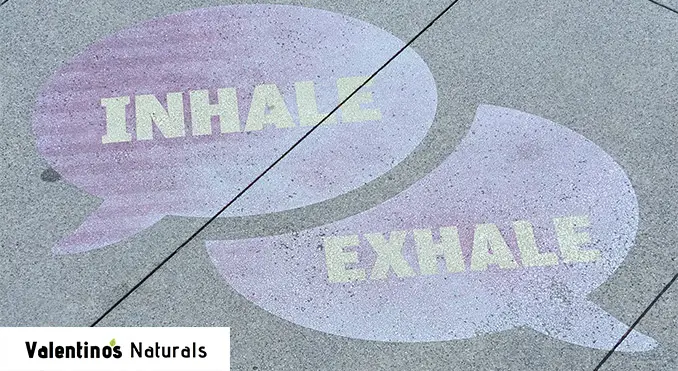For the most part, your breathing is an automatic process governed by the brainstem – the same part of the brain that controls your heartbeat and sleep.
But latest research shows us that breathing can very much change our brains. Put simply, changes in breathing (e.g. paying attention to your in- and out-breaths, as well as changing breathing patterns) will activate different parts of your brain.
Deep breathing benefits Intro
As humans, our control over our brain is unique: this includes suppressing thoughts, controlling emotions, and deciding to stay awake in spite of being tired.
It’s similar with breathing: while animals don’t alter their breathing speed at will, humans do.
By taking deep breaths, you are able to regulate your ANS (autonomic nervous system), leading to synchrony between your brain centers, and benefits such as:
- Improved focus
- Increased happiness & emotional control
- Lowered heart rate
- Reduced blood pressure
- Improved sense of calm and well-being
So with the introduction out of the way, this extensive post will show you everything from the mental benefits of deep breathing to exercises and ways you can incorporate this practice into your daily life.
Deep Breathing and the Brain
Here at Valentino’s Naturals, our focus is brain health, so we’ll take a deep dive into what deep breathing will do for your mind.
As it turns out, the yogis were right – specific patterns of breathing can really boost your focus and help your attention span. A study found that there’s a direct link between the brain and the breath. (1)
The researchers discovered that focused breathing regulates levels of norepinephrine, a natural brain chemical.
Whenever you’re curious, focused on a task, or emotionally aroused, your body releases some norepinephrine.
Norepinephrine enhances your focus, creativity, and overall brain health – boosting the growth of new neurons.
But here’s the problem:
When you’re always stressed, your brain keeps flooding the body with noradrenaline. This leads to a lack of focus.
On the flip side, when you’re lethargic the brain produces too little norepinephrine. And guess what… this makes it hard to focus as well.
The study I previously mentioned measured people’s breathing patterns, their focus, and activity in an area of their brains called ‘the locus coeruleus’. This is the part of the brain that makes norepinephrine.
Later, the researchers found that the people who had better sync between their breaths focused better on demanding tasks, compared to those who had irregular breathing patterns and poor focus.
Neuroscience of Breathing – How Does Deep Breathing Affect Your Brain?
Studies like this one showed us that as you breathe in, your locus coeruleus activity slightly increases. As you breathe out, it decreases. In other words, your attention is influenced by your breath.
Much like your breath, your focus rises and falls with each respiration cycle. It then makes sense that by regulating your breath, you can achieve deeper levels of attention.
But here’s where it gets interesting…
Breathing exercises also show promise in helping those with ADHD and various brain injuries.
The research is still in its early stages, but experts suggest that breathwork combined with meditation, can be a natural alternative to ADHD medication, as well as slow down or even halt age related cognitive decline in its tracks.
To quote Dr. Michael Melnychuk;
“Brains typically lose mass as they age, but less so in the brains of long-term meditators.”
Dr. Michael suggests that the brains of those who practice the likes of meditation and deep breathing have lower risk of dementia. Thanks to their brains being more resilient to the negative impacts of aging.
Psychological Effects of Deep Breathing
Deep breathing can reduce anxiety, balance your brain waves, and even reduce blood pressure. Some EEG recordings show that deep breathing can also raise alpha brain waves.
(2) Now, these are waves that are present when you’re relaxed, creative, and deeply focused on something. Meditation and daydreaming are things that can activate alpha brain waves.

For many of us, most of our days are spent in beta-brain waves, which link to states of alertness, arousal, and stress. When you want to relax and simply chill out, doing things like deep breathing will increase alpha brain waves and help put you in that calm headspace.
Deep Breathing Benefits
So far, we’ve learned the fundamentals of how deep breathing can affect your brain.
But how does deep breathing feel? And what benefits can you expect from making focused breathing a daily practice?
Let’s have a look at deep breathing benefits…
Makes You Happier
Deep breathing will help fight the blues and improve your mood through a number of ways. For one, it will boost your serotonin.
This is also known as your brain’s ‘happy hormone’.
People who take recreational substances like MDMA often do it because these compounds trigger a massive release of serotonin in the brain, leading to a feelings of bliss and euphoria. Luckily, focusing on your breath is a much safer (although maybe not as intense!) way of getting to that happy state.
Secondly, deep breathing also releases endorphins which will make you feel ‘alive’ and euphoric. Taking deep breaths will also kill off excess cortisol, the stress hormone that can dysregulate your serotonin and other mood-boosting neurotransmitters. (3)
>> Full Article: This is How Deep Breathing Boosts Your Serotonin Levels
Deep breathing benefits – Improves Memory
Deep breathing will affect how you think and remember things. Specifically, the ‘in’ breath is shown to affect the memory more than the ‘out’ breath.
When you practice deep breathing, your brain activity starts changing. Neuroscientists say that both inhalation and exhalation affect our limbic system. Consisting of the amygdala, hypothalamus and the piriform cortex, the limbic system is a part of the brain that regulates your memory, thinking, and mood.
In a study, volunteers who practiced deep breathing had better recollection of images and other data than those who didn’t watch their breath.
As it turned out, it also mattered whether the participants breathed through their nose or mouth. So, which one is better for memory? Find out the full answer in this article.
>>Full Article: Does Deep Breathing Improve Memory?
Improves Focus
Breathing the right way will increase alpha waves in your brain. As we’ve seen early in this post, alpha brain waves induce feelings of calm, creativity, and deep focus.
You know those times when you enter ‘the flow’ where time flies by and you get things done effortlessly?
Well, that’s in part thanks to alpha brain waves, which put you into a more focused and creative headspace, while enhancing mood at the same time.
Tip: You can also increase alpha brain waves by doing meditation or taking nootropics like l-theanine.
Relieves Tension & Stress
Now, this is probably the most well-known benefit of deep breathing. Whenever you’re under any kind of stress or tension, there’s a chance you’ll naturally take a deep breath. Why? Because it calms you down immediately.
It’s shown that deep breathing acts on the vagus nerve, which extends from your neck all the way to your gut. It’s in charge of your body’s ‘fight or flight’ response.
Taking deep breaths to stimulate the vagus nerve will trigger your relaxation response, which will naturally reduce your heart rate and lower blood pressure.
According to an integrative researcher Katie Brindle, deep breathing acts as a brake on your body’s stress response – bluting the stress hormone cortisol while promoting a cool and calm headspace.
deep breathing benefits Increases Mental Energy
This one is simple. Deep breathing will increase oxygen levels in your body. The more oxygen you have in your blood, the better your systems will function – including the brain which requires a vast amount of energy and can’t go for long without oxygen.
Deep breathing will also improve your physical stamina, in addition to its mental benefits.
Reduces Pain deep breathing benefits
Pain is influenced by not just physical factors, but emotional too. As we briefly talked, deep breathing triggers the spurt of chemicals like serotonin and endorphins. Endorphins in particular are natural pain killers, which also happen to improve mood & a sense of well-being.
If you’re into meditation practice, you know how distracting pain can be from achieving that deep focus and presence. Starting your meditation with a series of big deep breaths can help relax the nervous system, ease the pain, and help you reach deeper states of mindfulness.
How to do Deep Breathing Correctly
Many, if not most of us, don’t breathe with our whole respiratory system. Experts even suggest that many of us only use 33% of our capacity. Or one third.
The next time you see a newborn baby during sleep, notice how their whole body is breathing, and how their breathing is synchronized. Their chest, tummy, and back all move together with no obstructions.

Little children usually breathe into their bellies and chests. Much like an ebb and flow of an ocean wave, their breath moves seamlessly and consistently.
However, every one of us is unique, and so are our breathing patterns. Generally, there are three categories of people when it comes to the way they breathe:
- Chest breathers (most people)
- Belly breathers
- Midsection (diaphragmatic) breathers
The third breathing method is the one that will activate your whole respiratory system. And is generally the one that most studies have looked into when they investigated the benefits of deep breathing.
If you’re new to deep breathing, the next section will familiarize you with how to do it the right way. If you already have some experience with deep breathing, this will be a quick and easy reference guide for you.
Let’s take a look.
Deep Breathing Exercises
One of the basic rules for deep diaphragmatic breathing is to inhale through your nose and exhale through your mouth.
Here’s the basic deep breathing exercise you can do anytime, anywhere:
Diaphragm Breathing Exercise
- Sit comfortably on the floor, bed, or another flat surface.
- Loosen up your shoulders.
- Put one hand on your chest and another on your belly.
- Take a breath in through your nose for around 2 seconds. Feel the air moving through your nose into your stomach, making your abdomen expand. As you do this type of breathing, make sure your belly is expanding while your chest stays relatively still.
- Pucker your lips (as if you’re going to kiss someone), press your abdomen gently, and slowly exhale for two seconds or so.
- Repeat this process at least a few times for best results.
Rib-Stretch Breathing Exercise
This is another powerful yet simple deep breathing exercise you can do to calm your mind, improve focus, and relieve tension. Although in this one, you’re standing instead of sitting!
- Standing up straight with your back arched, breathe out completely.
- Breathe in slowly and take in as much air as you can.
- Hold the breath for 10 seconds or so.
- Exhale slowly through your mouth. It’s not needed to purse your lips, but you can if you want.
deep breathing benefits – Numbered Breathing
This is a great exercise for anyone who’s looking to gain control over their breathing patterns. As such, it can be a particularly powerful aid to your meditation practice or simply for boosting focus.
- Stand up and close your eyes.
- Breathe in, taking it as much air as you can.
- Exhale until the very end.
- Still keeping the eyes closed, inhale while imagining the number 1.
- Hold the breath for a few seconds, before letting it all out.
- Breathe in again while imagining the number 2.
- Hold the breath as you could in your mind to 3, then exhale.
- Repeat the process until you’ve reached number 8. You can go even higher if you want.
Deep Breathing Side Effects – Are There Any?
Many people do deep breathing naturally and unconsciously, without experiencing any negative side effects from it.
Still, it’s worth playing caution if you’re new to practicing deep breathing.
In beginners, common deep breathing side effects can include:
- Sleepiness
- Tingling sensation in extremities
- Lightheadedness
Also, deep breathing exercises aren’t always helpful on their own if you suffer from conditions like anxiety or chronic stress.

Generalized anxiety disorder (or simply GAD) can be hard to control. Deep breathing exercises can sometimes cause even more anxiety.
That’s why it’s important to talk with your doctor if you suffer from any kind of medical condition before making any significant changes to your lifestyle – such as taking on a deep breathing practice.
Techniques like talk therapy and cognitive-behavioral therapy are among the most used treatments for anxiety and other mental health disorders.
Anything Else to Consider?
Deep breathing is beneficial on so many levels. From helping you feel more confident and able to get rid of negative thought patterns to releasing tension and stress from the body.
Deep breathing can also increase your internal awareness, and as such, it has a spiritual effect as well. It deepens meditation and yoga practice, creates inner peace, and helps you gain higher states of consciousness.
And on top of it all, deep breathing recharges vitality, deepens creativity, lowers blood pressure, reduces pain, and improves sleep.
There are many different deep breathing exercises out there, but not all of them might work well for you. If you’re unsure, it’s always smart to talk to one of these professionals for advice on deep breathing:
- Your primary healthcare provider
- A cardiac specialist
- A therapist
- A physical therapist
- A licensed yoga or fitness teacher
Getting Started With Deep Breathing
Okay, so you’ve weighed all the pros and cons of deep breathing. And you decided to give it a go. Here are a few tips on getting started and making it into a habit:
- Create a routine. Practice deep breathing at the same time and the same place every day. Preferably somewhere where you can find peace and quiet.
- Don’t try to do it perfectly. But rather focus on doing it consistently, day after day.
- Forget about the things that are stressing you. Instead, direct your focus towards the rhythm of your breath or your body.
- For best results, practice deep breathing at least once or twice a day. Try doing these exercises at roughly the same time each day to engrain the habit.
- A reasonable length for beginners is 10 minutes per exercise, 20+ if you’re more experienced.
Deep Breathing Benefits FAQ
Is Deep Breathing Bad?
Deep breathing isn’t for everyone and can be bad when done incorrectly. One example would be taking in big breaths often, resulting in over-breathing.
This can mess up the oxygen-carbon dioxide exchange balance in your cells, which can impair blood flow to your brain. As a result, you might start to experience lightheadedness and tingling sensations. Lack of concentration, confusion and so on.
What Does Deep Breathing Do to the Brain?
Deep breathing activates certain areas of your brain like ‘the locus coeruleus’, which controls the release of norepinephrine. A brain chemical that helps you stay alert and focused.
In addition, deep breathing also enhances alpha brain waves which will put you in a relaxed and creative headspace.
Why is Deep Breathing so Important?
Controlled, deep breathing is important for helping your body and mind unwind. It’s also shown to affect numerous health markers like blood pressure and heart rate.
It’s important to know that deep breathing isn’t important for everyone; some people might actually feel worse from practicing deep breathing. That’s why it’s always smart to talk to your doctor before attempting a lifestyle change like deep breathing.
What is the Military Breathing Technique For Sleep?
The military breathing technique for sleep is a simple way of falling asleep fast. It switches off your body’s fight-or-flight response, and is endorsed by author and doctor Andrew Weil. Some people report falling asleep after just one minute of doing this exercise.
The military breathing technique for sleep goes like this:
First, exhale fully through your mouth while making a whoosh sound.
- Keeping your mouth closed, inhale quietly through your nose for the count of 4 seconds.
- Hold the breath for 7 seconds.
- Exhale fully through your mouth while making a whoosh sound for 8 seconds.
This was one round. For best results, repeat this for a total of four rounds.

Deep breathing benefits Wrapping Up
Deep breathing can help calm your mind, improve focus, and ease stress when done correctly.
The science shows there’s a good reason why this happens. During deep breathing, you activate your ANS which helps regulate mood, concentration, emotional control, heart rate, and blood pressure.
However, deep breathing shouldn’t be rushed. It should be slow and gentle. Remember to focus on your belly expanding, not only the chest. An easy way to ensure you’re doing this right is to place a hand on your abdomen and another hand on your chest. Then notice if your stomach is rising.
As you do deep breathing, keep your awareness on your breath, heartbeat, and other physical sensations. This will help release tension from your body. If you find it easier, you may lie down or sit in a comfortable position – not too stiff but not too slouched either.
Tip: Can’t find time to practice deep breathing? Try sneaking it into your schedule, like right upon waking up and going to sleep, commuting to work, in the shower, or even putting a reminder on a post-it note.
It’s such a short, simple and effective exercise that there’s really no excuse for not doing it. Unless you have a medical condition, in which case you should always speak with your doctor first.
Deep breath in… and out…
Deep breathing benefits references
- Coupling of respiration and attention via the locus coeruleus: Effects of meditation and pranayama. (source)
- Extreme prolongation of expiration breathing: Effects on electroencephalogram and autonomic nervous function. (source)
- Correlation between cortisol level and serotonin uptake in patients with chronic stress and depression. (source)



